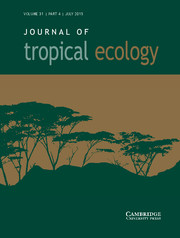Crossref Citations
This article has been cited by the following publications. This list is generated based on data provided by
Crossref.
Maisels, F.
Keming, E.
Kemei, M.
and
Toh, C.
2001.
The extirpation of large mammals and implications for montane forest conservation: the case of the Kilum-Ijim Forest, North-west Province, Cameroon.
Oryx,
Vol. 35,
Issue. 4,
p.
322.
Maisels, F.
Keming, E.
Kemei, M.
and
Toh, C.
2001.
The extirpation of large mammals and implications for montane forest conservation: the case of the Kilum-Ijim Forest, North-west Province, Cameroon.
Oryx,
Vol. 35,
Issue. 4,
p.
322.
Catling, Paul M.
2001.
Extinction and the importance of history and dependence in conservation.
Biodiversity,
Vol. 2,
Issue. 3,
p.
2.
Sarmiento, Esteban E.
2002.
Gorilla Biology.
p.
432.
Cristoffer, Cris
and
Peres, Carlos A.
2003.
Elephants versus butterflies: the ecological role of large herbivores in the evolutionary history of two tropical worlds.
Journal of Biogeography,
Vol. 30,
Issue. 9,
p.
1357.
Kominami, Yohsuke
Sato, Tamotsu
Takeshita, Keiko
Manabe, Tohru
Endo, Akira
and
Noma, Naohiko
2003.
Classification of bird-dispersed plants by fruiting phenology, fruit size, and growth form in a primary lucidophyllous forest: an analysis, with implications for the conservation of fruit-bird interactions.
ORNITHOLOGICAL SCIENCE,
Vol. 2,
Issue. 1,
p.
3.
Sheil, Douglas
and
Salim, Agus
2004.
Forest Tree Persistence, Elephants, and Stem Scars.
Biotropica,
Vol. 36,
Issue. 4,
p.
505.
Sheil, Douglas
and
Salim, Agus
2004.
Forest Tree Persistence, Elephants, and Stem Scars1.
BIOTROPICA,
Vol. 36,
Issue. 4,
p.
505.
Muller-Landau, Helene C.
and
Hardesty, Britta Denise
2005.
Biotic Interactions in the Tropics.
p.
267.
Feild, Taylor S.
and
Arens, Nan Crystal
2005.
Form, function and environments of the early angiosperms: merging extant phylogeny and ecophysiology with fossils.
New Phytologist,
Vol. 166,
Issue. 2,
p.
383.
Dominy, Nathaniel J.
and
Duncan, Brean W.
2005.
Seed-spitting Primates and the Conservation and Dispersion of Large-seeded Trees.
International Journal of Primatology,
Vol. 26,
Issue. 3,
p.
631.
Stoner, Kathryn E.
Riba‐Hernández, Pablo
Vulinec, Kevina
and
Lambert, Joanna E.
2007.
The Role of Mammals in Creating and Modifying Seedshadows in Tropical Forests and Some Possible Consequences of Their Elimination.
Biotropica,
Vol. 39,
Issue. 3,
p.
316.
Morgan, Bethan
2007.
BIODIVERSITY ANIMAL TREASURY.
Biodiversity,
Vol. 8,
Issue. 2,
p.
25.
Babweteera, Fred
Savill, Peter
and
Brown, Nick
2007.
Balanites wilsoniana: Regeneration with and without elephants.
Biological Conservation,
Vol. 134,
Issue. 1,
p.
40.
Muller‐Landau, Helene C.
2007.
Predicting the Long‐Term Effects of Hunting on Plant Species Composition and Diversity in Tropical Forests.
Biotropica,
Vol. 39,
Issue. 3,
p.
372.
Blake, Stephen
Deem, Sharon Lynn
Mossimbo, Eric
Maisels, Fiona
and
Walsh, Peter
2009.
Forest Elephants: Tree Planters of the Congo.
Biotropica,
Vol. 41,
Issue. 4,
p.
459.
Tropek, Robert
and
Konvicka, Martin
2010.
Forest eternal? Endemic butterflies of the Bamenda highlands, Cameroon, avoid close‐canopy forest.
African Journal of Ecology,
Vol. 48,
Issue. 2,
p.
428.
Campos-Arceiz, Ahimsa
and
Blake, Steve
2011.
Megagardeners of the forest – the role of elephants in seed dispersal.
Acta Oecologica,
Vol. 37,
Issue. 6,
p.
542.
Lagendijk, D. D. Georgette
Mackey, Robin L.
Page, Bruce R.
Slotow, Rob
and
Wright, Justin
2011.
The Effects of Herbivory by a Mega- and Mesoherbivore on Tree Recruitment in Sand Forest, South Africa.
PLoS ONE,
Vol. 6,
Issue. 3,
p.
e17983.
Hawthorne, W.D.
Sheil, D.
Agyeman, V.K.
Abu Juam, M.
and
Marshall, C.A.M.
2012.
Logging scars in Ghanaian high forest: Towards improved models for sustainable production.
Forest Ecology and Management,
Vol. 271,
Issue. ,
p.
27.


